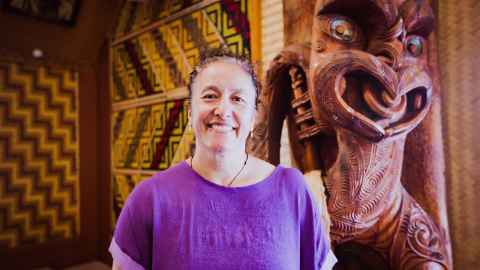How to get more Kiwis into clinical trials
26 November 2020
A new study will explore how to get more New Zealanders into clinical trials, especially rural people, Māori and Pasifika.

A new study led by a national team of expert clinicians and health researchers will explore ways to increase the number of New Zealanders participating in clinical trials – particularly those living in rural communities and Māori and Pasifika – to ensure equitable access to the latest and most cutting-edge healthcare.
University of Auckland’s Professor Frank Bloomfield and Associate Professor Matire Harwood (Ngāpuhi), together with Professors Lisa Stamp and Katrina Sharples from the University of Otago and Professor Stuart Dalziel (University of Auckland), are co-leading this joint Ministry of Health and Health Research Council-funded study, which will provide evidence-based recommendations on how New Zealanders and the New Zealand health system can better receive the benefits of clinical trials.
Participation in clinical trials improves health outcomes, but rural people, Māori and Pasifika are less likely to take part.
Clinical trials play a vital role in answering questions about how to manage a particular disease, with trials of new drugs or vaccines only a small component of this. For example, clinical trials can also investigate whether and how to introduce new technologies into general use or compare the relative effectiveness of commonly used treatments.
Clinical trial participants can receive access to the latest ways to detect, diagnose, treat and prevent disease, and receive healthcare from leading medical experts and facilities that they may not ordinarily have access to. This is always balanced against any risk.
However, despite these benefits, Professor Bloomfield, of the Liggins Institute, says participation in clinical trials across Aotearoa New Zealand is inequitable for patients outside of major urban areas and by ethnicity.
“This disparity is compounding existing health inequities given the clear evidence that participation in clinical trials improves health outcomes, irrespective of what intervention participants are randomised to receive,” says Professor Bloomfield. Associate Professor Harwood, who will chair the study’s Māori Advisory Team, says many patients may not be receiving care based on the best available evidence.

“For many interventions and practices of care, high-quality evidence is lacking or is used inconsistently across the country. This means that patients may receive care that varies depending on their location, ethnicity, healthcare provider, even on the day of the week that they are seen in a consultation or admitted to hospital.”
“A coordinated national clinical trials system – something we do not currently have – has the potential to improve this inequity, increase participation in clinical trials and enable our health system to translate evidence more rapidly and consistently into clinical practice for the benefit of all. That is what we want to help work towards with this study,” says Associate Professor Harwood.
HRC Chief Executive Professor Sunny Collings says Aotearoa New Zealand has a strong foundation in clinical research and there is much untapped potential within our clinical trials system. The results from this study will help inform what a new operating model for clinical trials in our country could look like, in line with leading international approaches and best practice.
For many interventions and practices of care, high-quality evidence is lacking or is used inconsistently across the country
“Clinical trials enable our health system and health professionals to continuously learn and get better at what they do. However, many health providers are unable to conduct clinical trials, simply because they do not have the expertise, networks, and systems in place. And where trials are taking place within the health system, they can be quite disconnected from healthcare delivery.
This study will also provide recommendations on workforce capability, clinical trial networks, moving evidence rapidly into clinical practice, and optimising data management within the clinical trials system,” says Professor Collings.Chief Science Advisor at the Ministry of Health, Professor Ian Town, says now more than ever New Zealanders are aware of the importance of scientific evidence and the vital role of clinical research in finding solutions for the many health challenges we face.
“Throughout the current pandemic, clinical care for people with COVID-19 has improved by leveraging the world’s clinical research expertise and infrastructure. Getting Aotearoa New Zealand’s clinical trials better organised and embedded within our health system is a key way to further build our resilience. This is a priority initiative for us under the Health Research Strategy and we look forward to working alongside the HRC, the wider health sector, and this strong and diverse research team to help achieve this,” says Professor Town.
Health Research Council of New Zealand Press Release